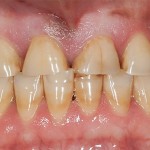 Bruxism is the excessive grinding of the teeth and/or excessive clenching of the jaw. It is an oral parafunctional activity, i.e., it is unrelated to normal function such as eating or talking. Bruxism is a common problem. There are two main types of bruxism: that which occurs during sleep (sleep bruxism) and that which occurs during wakefulness (awake bruxism). Dental damage may be similar in both types, but the symptoms of sleep bruxism tend to be worst on waking, and the symptoms of awake bruxism may not be present at all on waking, and then worsen over the day.The causes of bruxism are not completely understood, but probably involve multiple factors including stress. Bruxism may cause minimal symptoms, and therefore people may not be aware of the condition. Symptoms commonly associated with bruxism include hypersensitive teeth, aching jaw muscles, and headaches. Bruxism may cause tooth wear, and even damage or break teeth and dental restorations such as crowns and fillings. Treatment revolves around repairing the damage to teeth that has already occurred, and also night-guards to prevent further damage.
Bruxism is the excessive grinding of the teeth and/or excessive clenching of the jaw. It is an oral parafunctional activity, i.e., it is unrelated to normal function such as eating or talking. Bruxism is a common problem. There are two main types of bruxism: that which occurs during sleep (sleep bruxism) and that which occurs during wakefulness (awake bruxism). Dental damage may be similar in both types, but the symptoms of sleep bruxism tend to be worst on waking, and the symptoms of awake bruxism may not be present at all on waking, and then worsen over the day.The causes of bruxism are not completely understood, but probably involve multiple factors including stress. Bruxism may cause minimal symptoms, and therefore people may not be aware of the condition. Symptoms commonly associated with bruxism include hypersensitive teeth, aching jaw muscles, and headaches. Bruxism may cause tooth wear, and even damage or break teeth and dental restorations such as crowns and fillings. Treatment revolves around repairing the damage to teeth that has already occurred, and also night-guards to prevent further damage.

- Home
- About Us
- Services
- Dental Lifestyle
- Wedding Smiles
- Gallery
- Contact Us
+91 1724648877
+91 9015455577
Clinic Timings
Mon - Sat - 9.30 AM to 2.00 PM
4.00 PM to 7.00 PM
Sunday By Prior Appointment
+91 9015455577
Clinic Timings
Mon - Sat - 9.30 AM to 2.00 PM
4.00 PM to 7.00 PM
Sunday By Prior Appointment


